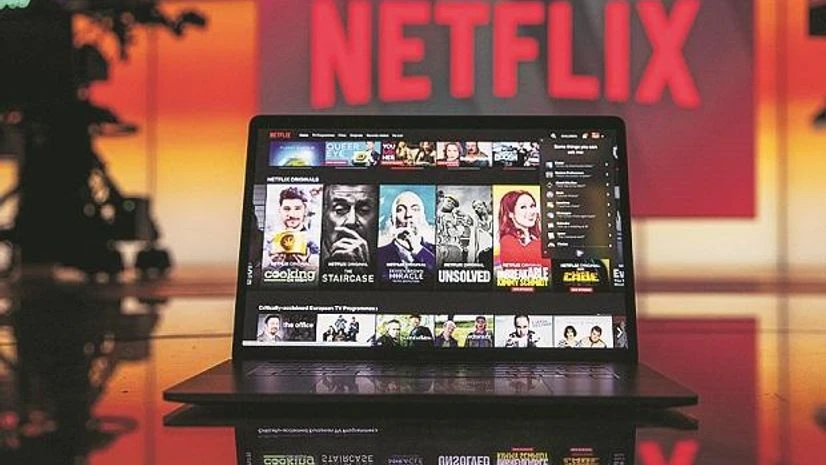Long hours before the screen, bingeing on your favourite show as the night slips into dawn and another day beckons that this all too familiar scenario can spiral into a medically certifiable addiction is already in evidence, say doctors.
There is increasing anecdotal evidence of people getting hooked to multiple screens television, computer and phone -- with online video streaming platforms like Netflix, Hotstar and Amazon Prime offering entire seasons of television shows and thousands of films at the touch of a button.
Now, in what could be India's first such case, a 26-year-old in Bangalore is being treated for "Netflix addiction".
The young man, being treated at Bangalore's National Institute of Mental Health and Neurosciences (NIMHANS), reportedly turned to the online video streaming platform to keep himself occupied during a six-month period of unemployment before he realised he just couldn't stop.
"He used to watch (online series) for seven hours, and sometimes it would go up to 10 hours per day. It led to loss of control, withdrawal. When his parents asked him not to watch, he would get angry and irritated," Manoj Kumar Sharma, who is treating the man, told PTI.
Netflix, which came to India two years ago, said they did not have a comment on the incident.
According to Mumbai-based psychologist Harish Shetty, addicts of online television can be spotted by their behavioural and viewing patterns.
More From This Section
Much like drugs, addicts of online television feel the need to watch shows every day, gradually withdrawing from their environment. This often results in strained and dysfunctional relationships in both the personal and professional spheres.
"One begins to crave for it (shows), getting angry when he/she is unable to do what he wants. There is very little communication with the people around," Shetty told PTI.
What initially starts as an entertaining activity soon turns into a habit, so much so that addicts begin prioritising television over relationships and work.
Kasturi Roy Bardhan agreed with Shetty's premise.
Binge-watching shows, said the 28-year-old, has helped her switch off when something sad or upsetting might be happening in her life. Like the NIMHANS patient, she has, in the past, focused her attention on online shows to shut out reality.
The longest she sat in front of the screen was when she finished an entire season of the British crime drama Broadchurch. A season comprises eight episodes, each 45 minutes long that's six straight hours of television watching.
But the UK-based research student said she is not an addict. She admitted to neglecting relationships and work in the past due the kind of time she spent on Netflix, but said she withdrew when she realised the damage it was doing.
A few months ago I was binge watching Downton Abbey' instead of writing my dissertation which was due in a month's time. Now, I sit on Netflix once every two days, Bardhan said.
According to comparison website Finder India, Netflix's India library, which began with 826 titles, is among the most extensive in the world. It now has 4,706 titles -- 3,342 films and 1,364 TV shows.
Research firm Media Partners Asia noted in its July 2018 report that India's online video market, driven by competition among well-capitalized global and local platforms, was growing rapidly and the trend was expected to continue for the "next three years".
"India's 14 per cent annual growth in video content investment was a standout in 2017," the report stated.
With so many options available at the push of a button, Shetty said people often found themselves in front of their screens for long hours and get anchored to it sooner than they realise.
Addicts start watching shows through the night, and anchoring happens, he said, adding that the health impacts were dangerous.
Media agency Zenith, in its Online Video Forecasts 2018, predicted that consumers of online videos globally were expected to spend an average of 67 minutes a day watching online video this year, up from 56 minutes last year.
Depression, anxiety, high blood pressure and psychosomatic illnesses are some major consequences of binge watching.
The NIMHANS patient reported eye strain, and also complained of fatigue, Sharma said.
However, if done right, one can enjoy the best of both worlds.
Waled Adnan, who sits on Netflix and other online video streaming platforms rather regularly, has managed to steer clear of turning into an addict by regulating his screen time.
I sit on these platforms about three-four days a week, but not all these sessions are in order to binge, Adnan said.
The 27-year-old risk analyst has also discovered the joy of savouring a TV show one episode at a time instead of devouring a seven-hour production in a single sitting.
I'm mostly a TV show person, I like broad storylines, extensive character development, and witty, quirky writing. But there are certain shows that I decide beforehand that I will savour and watch, he said.
Shetty suggested that monitoring viewing time and hours, and hitting the bed early after dinner should help you stay away from a potential addiction.
Increase your communication with friends and family members. Post dinner, instead of watching shows, go out for walks. Meet people live. That is most important, the medical expert advised.

)
